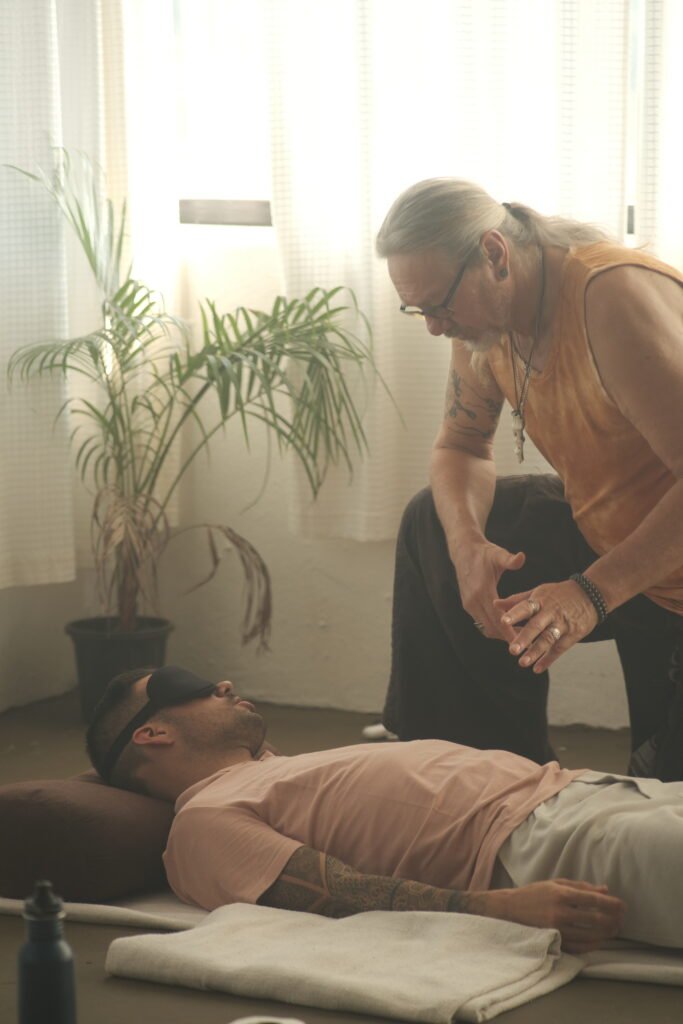In today’s fast-paced world, it’s easy to feel overwhelmed by stress, anxiety, or mental fatigue. The good news is that there’s a simple yet powerful technique to help calm the mind, reduce stress, and improve your overall wellbeing: breathwork.
Breathwork refers to a variety of breathing exercises that can help regulate your body’s stress response, enhance emotional balance, and even increase physical energy. Whether you’re dealing with everyday stress or looking for ways to deepen your sense of relaxation, a breathwork session might be just what you need.

What is Breathwork?
Breathwork is the practice of consciously controlling your breath to improve mental, emotional, and physical health. By focusing on your breath, you can influence the autonomic nervous system and activate the parasympathetic nervous system, which is responsible for promoting relaxation. This helps counteract the “fight or flight” response and encourages a sense of calm and clarity.
The Benefits of a Breathwork Session
Participating in a breathwork session offers numerous benefits, making it an effective tool for managing stress and improving mental health:
1. Reduces Stress & Anxiety
One of the most immediate benefits of breathwork is its ability to lower stress levels. By focusing on deep, slow breaths, you activate the body’s relaxation response, which reduces the production of stress hormones like cortisol. This helps to bring your body and mind back into balance.
2. Improves Focus & Clarity
Breathwork is not only great for relaxation but also for mental clarity. The simple act of breathing mindfully helps to calm the racing thoughts that often accompany stress, allowing you to focus better and make more informed decisions.
3. Boosts Energy Levels
Deep breathing exercises can increase oxygen flow to your cells, enhancing your energy levels. A breathwork session can help you feel more refreshed and energized, making it an ideal practice for mid-day slumps or mental fog.
4. Enhances Emotional Wellbeing
Breathwork can also help process and release difficult emotions. Some breathing techniques are designed to bring suppressed emotions to the surface, allowing you to confront and release them in a healthy way. This can result in a profound sense of emotional relief.
5. Improves Sleep
For those struggling with insomnia or poor-quality sleep, breathwork can be a game-changer. Deep breathing exercises, especially those practiced before bedtime, can calm the nervous system, reduce racing thoughts, and promote deeper, more restful sleep.

Common Breathwork Techniques Used in Sessions
Breathwork sessions often include a variety of techniques, each designed to address specific needs. Here are a few popular ones you might encounter:
1. Box Breathing (4-4-4-4 Method)
This technique involves inhaling for 4 counts, holding the breath for 4 counts, exhaling for 4 counts, and holding again for 4 counts. Box breathing helps reduce stress and anxiety by promoting a balanced rhythm of inhalation and exhalation.
2. Abdominal Breathing
Also known as diaphragmatic breathing, this technique encourages deep, slow breaths that expand the belly rather than the chest. This method helps activate the parasympathetic nervous system, leading to a relaxed and centered feeling.
3. Alternate Nostril Breathing
This method involves breathing through one nostril at a time while closing the other, alternating between both sides. It is believed to balance the right and left hemispheres of the brain, promote mental clarity, and relieve stress.
4. Holotropic Breathwork
Holotropic breathwork is a more intense form of breathwork often used for emotional release and deep self-exploration. It involves rapid, controlled breathing designed to induce an altered state of consciousness and facilitate healing.
5. Resonant Breathing
This involves breathing at a slow, steady pace, typically 5 to 6 breaths per minute. Resonant breathing helps regulate the heart rate, increase heart rate variability, and improve overall stress resilience.

What to Expect in a Breathwork Session
A typical breathwork session can vary depending on the instructor, but most sessions follow a similar structure:
1. Introduction
The session usually begins with a brief introduction, where the instructor explains the goals of the session and introduces the techniques that will be practiced.
2. Guided Breathing
The instructor will guide you through various breathing exercises, encouraging you to focus on your breath, become aware of any sensations in your body, and relax.
3. Relaxation
After the active breathing exercises, there will often be a relaxation period where you can lie down and integrate the effects of the breathwork. This is a great time to notice how your body feels and observe any shifts in your mental or emotional state.
4. Reflection
Many breathwork sessions end with a reflection period, where participants can share their experiences or simply sit in silence. This helps process any emotions or sensations that may have come up during the session.
How to Prepare for a Breathwork Session
To get the most out of your breathwork session, here are some tips to prepare:
• Find a Quiet Space
It’s important to choose a space where you won’t be disturbed during your session. Whether it’s in your home or a studio, make sure you have a peaceful environment.
• Wear Comfortable Clothing
You’ll want to wear loose, comfortable clothing to ensure you can breathe deeply and fully without restrictions.
• Stay Hydrated
Breathwork can be a physically intense experience, so be sure to drink plenty of water before and after your session.
• Set an Intention
Many people find it helpful to set an intention before starting their breathwork session. Whether it’s reducing stress, increasing energy, or emotional release, having a clear focus can enhance your experience.
How Often Should You Practice Breathwork?
Breathwork is a personal practice, and how often you engage with it depends on your needs and goals. Some people find daily practice helps them stay calm and focused, while others may use breathwork as a tool for managing acute stress or anxiety.
If you’re new to breathwork, it’s a good idea to start with a few sessions per week. As you become more comfortable with the techniques, you may choose to incorporate breathwork into your daily routine.

Book Your Breathwork Session Today!
If you’re ready to experience the transformative benefits of breathwork for yourself, consider booking a breathwork session with a qualified instructor. Whether you’re looking to reduce stress, enhance mental clarity, or improve your overall health, a breathwork session can help you achieve your goals. Take the first step toward a calmer, more balanced life today.
Book a breathwork session with one of our expert instructors and discover the power of your breath. Write us & we’ll guide you where to start!

